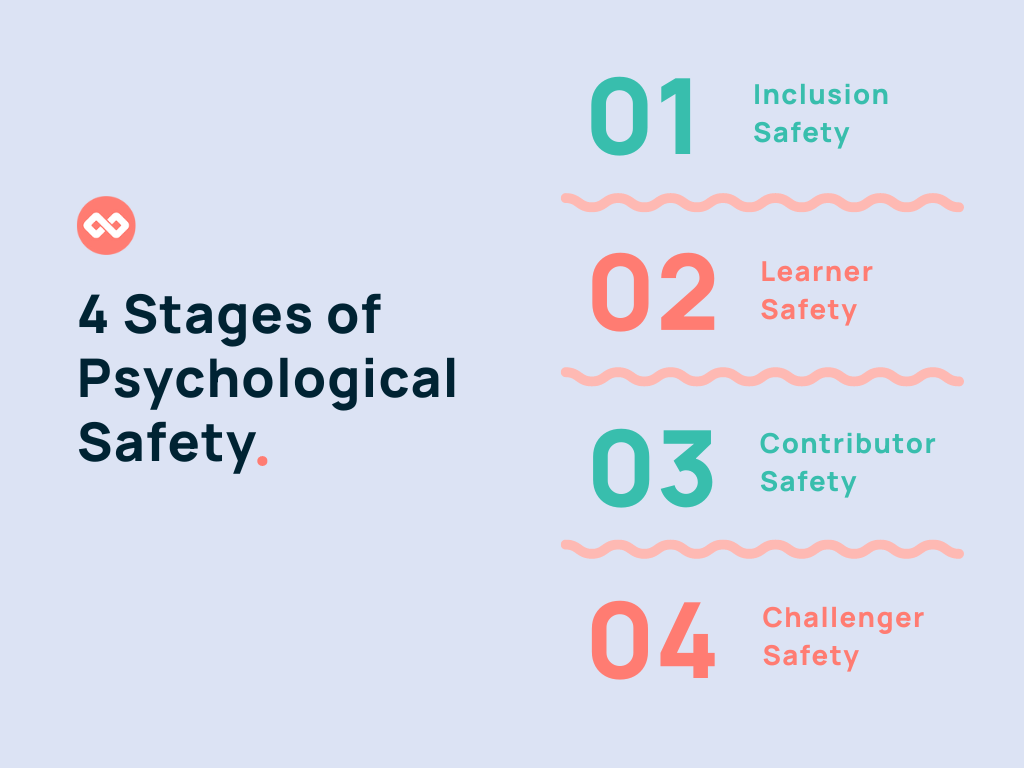What is psychological safety and how can mentoring improve it in the workplace?
According to Australian researchers Alexander Newman, Ross Donohue, and Nathan Eva, the term psychological safety refers to “…a shared belief amongst individuals as to whether it is safe to engage in interpersonal risk-taking in the workplace.”
In other words:
Psychologically safe teams trust each other to experiment without judgement, voice opinions without being shamed, and fail without being labelled a failure.
It refers to a workplace environment where individuals feel comfortable taking interpersonal risks, such as expressing their opinions or ideas without fear of negative consequences. And mentoring is a tool that can improve psychological safety in the workplace by providing a supportive relationship where the mentee can receive constructive feedback, guidance, and encouragement. By building strong mentoring relationships, employees feel more comfortable sharing their thoughts and ideas, which can lead to a more open and collaborative work environment that fosters creativity and innovation.
Who is responsible for it in the workplace?
That’s an easy one – everyone in the company. However, embedding it into a workplace culture starts with leaders and mentors.
It’s a shared responsibility that involves all – leaders, managers, mentors, and mentees:
- Leaders and managers play a critical role in setting the tone for the organization and establishing policies and practices that promote psychological safety.
- Mentors can also contribute to creating a psychologically safe environment by building a relationship of trust and respect with their mentee and creating a safe space for open and honest communication.
- Mentees can also contribute to a psychologically safe environment by actively participating in the mentoring relationship and sharing their thoughts and ideas with their mentor.
Ultimately, it is everyone’s responsibility to promote a culture of psychological safety in the workplace or mentoring program.

The Perks of a Psychologically Safe Environment
A climate of psychological safety can facilitate innovativeness within organisations. Newman, Donohue, and Eva found that:
At the individual level, there is growing evidence that supportive organisational practices are positively related to employee work outcomes such as organisational commitment and job performance as they heighten perceptions of psychological safety. For example, research has found that employee perceptions of organisational support (Carmeli & Zisu, 2009), access to mentoring (Chen et al., 2014), and diversity practices (Singh et al., 2013) foster work outcomes through the mediating mechanism of psychological safety.
Similarly, another study found that the amount of formal mentoring provided by mentors related positively to mentees’ affective commitment and related negatively to turnover intention.
A psychologically safe environment in the workplace or mentoring program can have several benefits, including:
| Increased productivity | When employees or mentees feel safe to take risks and share their thoughts and ideas, they may be more motivated to work harder and collaborate more effectively. |
| Improved creativity and innovation | A psychologically safe environment can encourage more diverse and innovative ideas, leading to new solutions and approaches. |
| Better communication | When individuals feel psychologically safe, they may be more open and honest in their communication, leading to more effective and constructive dialogue. |
| Higher employee or mentee engagement | Individuals who feel safe and supported may be more engaged in their work or mentoring relationship, leading to higher job satisfaction and retention. |
| Reduced stress and burnout | A psychologically safe environment can help reduce stress and burnout, as individuals may feel more supported and less anxious about expressing their thoughts and ideas. |
Harnessing the Power of Mentoring
Psychological safety can account for some of the influence mentoring has on innovativeness. In other words, mentoring can lead to monumental innovation due to the psychological safety that it creates within organisations.
In Mentoring Top Leadership Promotes Organisational Innovativeness through Psychological Safety and Is Moderated by Cognitive Adaptability, James H. Moore and Zhongming Wang found:
- The quality of mentoring individuals is linked to their perception of organisational innovativeness (meaning effective mentoring is one way to increase innovativeness).
- Individuals’ perception of psychological safety within an organisation mediates the relationship between the quality of mentoring and their perception of organisational innovativeness (meaning effective mentoring is another way to improve innovativeness via the development of psychological safety).
- Cognitive adaptability negatively moderates the relationship between mentoring and innovativeness (meaning effective mentoring can help leaders with lower levels of cognitive adaptability to foster innovativeness within the organisation).
This means that it’s important to establish a psychologically safe environment in order to “inspire not only top leadership to try new avenues but also to encourage/enable all those within the organisation to feel free to express their opinions and ideas.”
Ultimately, organisations should proactively and selectively prioritise mentoring, especially among top leadership, while taking into consideration individuals’ differing levels of cognitive adaptability. The implementation of a mentoring program can not only create a psychologically safe workplace, but can inspire innovation, increase organisational commitment, boost job performance, and decrease turnover.
Do these sound like some perks you’d be interested in? The path to achieving them isn’t as difficult as you might think. Start by connecting your people across teams with Mentorloop; learn how by checking out a demo.
Creating a Mentoring Culture to Support Psychological Safety
Establishing a mentoring culture within an organization is a fundamental step toward promoting psychological safety. By encouraging experienced employees to serve as mentors, companies demonstrate their commitment to employee growth and development. Mentoring relationships not only offer valuable guidance but also create a space for open conversations and a sense of belonging. This culture of mentoring fosters an atmosphere where employees feel supported and empowered to voice their opinions, contributing to a psychologically safe workplace environment.
Imagine a workplace where employees are not just seen as workers, but as individuals with unique skills, experiences, and aspirations. In a mentoring culture, this becomes a reality. Mentors take the time to understand their mentees on a personal level, recognizing their strengths and areas for growth. Through ongoing conversations and quality feedback, mentors help mentees navigate their professional journey, offering insights and advice based on their own experiences.
The benefits of a mentoring culture extend well beyond individual growth:
When employees feel supported and valued, they are more likely to collaborate and share their ideas openly. This leads to increased innovation and creativity within the organization. By fostering an environment where psychological safety is prioritized, companies can tap into the diverse perspectives and talents of their workforce, driving positive change and growth.
One of the key aspects of a mentoring culture is the establishment of trust. Mentors not only provide guidance but also act as confidants for their mentees. Through regular check-ins and one-on-one meetings, mentors create a safe space for mentees to share their challenges, concerns, and aspirations. This trust-building process allows mentees to feel comfortable discussing sensitive topics, knowing that their mentor will provide support and guidance without judgment.
Mentors serve as role models and advocates for their mentees, helping them navigate the natural complexities of the workplace. This sense of belonging is crucial for psychological safety, as it allows employees to feel accepted and valued for who they are, regardless of their background or identity. When individuals feel a sense of belonging, they are more likely to contribute their unique perspectives and ideas, leading to a more inclusive and innovative work environment.
Investing in a mentoring culture is not only beneficial for individual growth but also for the collective growth and success of the entire organization.
Developing an Effective Mentoring Program for Psychological Safety
To ensure that mentoring programs effectively contribute to psychological safety, organizations must develop structured and well-designed programs. By creating a supportive framework, organizations can ensure that mentoring programs serve as a catalyst for building psychological safety within the workplace. Mentorloop makes this easy with a quality participant experience, providing supportive resources to both mentors and mentees, enabling them to navigate the mentoring relationship effectively.
When developing an effective mentoring program, it is crucial to consider the unique needs and goals of both mentors and mentees. By taking the time to understand their expectations and aspirations, organizations can facilitate meaningful connections that foster psychological safety. For example, a mentee who is seeking guidance on career advancement may benefit from a mentor who has successfully navigated similar professional challenges. On the other hand, a mentor who is passionate about developing leadership skills may find fulfillment in guiding a mentee who is eager to learn and grow in that area. It’s easy to capture this data with Mentorloop, as you design your sign-up form and matching criteria.
Once mentors and mentees have been carefully matched, organizations should provide comprehensive training to equip them with the necessary skills and knowledge to navigate the mentoring relationship effectively. This training may include topics such as active listening, being self-aware, being intentional with their time, and providing constructive feedback. By investing in mentorship training, organizations can ensure that mentors are equipped with the tools they need to guide and support their mentees, while also fostering an environment of psychological safety.
In addition to training and resources, establishing a feedback mechanism to evaluate the effectiveness of their mentoring programs. Regular check-ins and surveys can provide valuable insights into the experiences of mentors and mentees, allowing organizations to make necessary adjustments and improvements. This feedback loop not only ensures that the program remains relevant and impactful but also demonstrates to participants that their voices are heard and valued.
Mentorloop is the only mentoring platform with real-time sentiment feedback and analysis – ensuring you’re gathering qualitative and quantitative data from your participants, giving you actionable insights –read more about the Mentorloop Sentiment System and say goodbye to annual surveys.
By developing a structured and well-designed mentoring program that carefully matches mentors and mentees, provides comprehensive training and ongoing resources, and establishes a feedback mechanism, organizations can easily create an environment where psychological safety thrives. Mentoring programs become more than just a means of professional development; they become a platform for building trust, fostering growth, and cultivating a sense of belonging within the workplace.
Understanding the Role of Mentoring in Achieving Psychological Safety
Mentoring plays a vital role in achieving psychological safety as it facilitates the creation of trusting relationships between mentors and mentees. Mentors serve as role models, offering guidance and support, and providing a safe space for mentees to express themselves. Through regular interactions and feedback, mentors can help mentees develop confidence and a sense of belonging. This support and encouragement contribute to the overall psychological safety of the mentee, enabling them to thrive in their professional environment.
The Impact of Mentoring on Employee Psychological Well-Being
Research has consistently shown the positive impact of mentoring on employee psychological well-being. Mentoring relationships helps reduce feelings of isolation and stress by providing emotional support and guidance. Mentees experience increased job satisfaction and motivation when they feel supported and valued by their mentors. Additionally, mentors themselves benefit from the fulfillment and personal growth that comes from supporting others. Ultimately, the impact of mentoring extends beyond individual employees, positively influencing the overall psychological health and productivity of the entire workforce.
Promoting Open Communication Through Mentoring for Psychological Safety
Effective communication is a cornerstone of psychological safety within teams. Mentoring relationships act as a platform for encouraging open dialogues where employees feel safe to share their concerns, ideas, and challenges. By fostering active listening and providing constructive feedback, mentors create an environment that values diverse perspectives and promotes inclusive decision-making. This open communication not only enhances psychological safety but also contributes to the overall success and innovation of the organization.
The Four Stages of Psychological Safety
Psychological safety within teams can be understood through four distinct stages: inclusion, learner safety, contributor safety, and challenger safety. In the initial inclusion stage, team members feel a sense of belonging and acceptance, allowing them to express themselves authentically. The learner safety stage emphasizes the importance of embracing growth and embracing a learning mindset. Contributor safety focuses on creating an environment where employees feel comfortable contributing their ideas and opinions. Finally, challenger safety represents a stage where team members are encouraged to respectfully challenge the status quo and engage in constructive debates. By guiding employees through these stages, mentoring can facilitate the development of psychological safety within teams.

Learn more: The Four Stages of Psychological Safety.
Creating a psychologically safe workplace is crucial for businesses to thrive in today’s rapidly evolving landscape. By leveraging the power of mentoring, organizations can foster an environment where employees feel supported, valued, and empowered to share their authentic selves. Through mentoring programs and a strong mentoring culture, companies can ensure that psychological safety becomes a foundation for innovation, collaboration, and overall success. Embracing mentoring as a tool for psychological safety is not only beneficial for individual employees but also for the growth and resilience of the organization as a whole.





